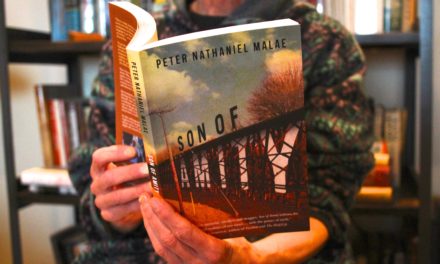By Kelly Oristano
A grateful and well-informed audience last weekend enjoyed some remarkable storytelling from Minority Voices Theatre (MVT). Two staged readings of one act plays in the Stage Left space at the Very Little Theatre (VLT) cast a spotlight on stories that are too infrequently told on Eugene area stages. Both plays were evocative biographical essays about their historically significant subjects.
The first was Hattie’s Vote, by local writer Dorothy Velasco. Hattie’s Vote presents a stylized biography of Hattie Redmond, a Black suffragist who moved from St. Louis to Oregon with her family in the aftermath of the Civil War. Her father Reuben Crawford, an apprentice shipwright, moved his family here after buying his freedom: “I figure a place called ‘Port Land,’ must need a lot of shipwrights!”
Hattie would meet and form a political alliance, as well as a mutually beneficial friendship, with Dr. Esther Lovejoy, a white Suffragist, but one who stayed committed to suffrage for all when other white Oregon women were thinking about taking the franchise to themselves and leaving women of color out in the cold. This weekend’s reading starred Martha Moultry as Hattie, Stanley Coleman as Reuben, and Storm Kennedy as Esther. Hershell Norwood narrated and was director. The cast had a warm camaraderie and a clear love for their subject. Ms. Moultry was an ebullient Hattie.
If the play has a subject beyond Hattie’s inspiring biography, that subject is the power of each citizen’s franchise, as exercised through their vote. Hattie, Reuben, and Esther are not bound in this play to a time or a place. Early in the play Hattie has intrusive visions of Stacey Abrams, a woman of color like herself, still out in these streets protecting the right to vote and have that vote count in the 21st Century. Reuben is a little mystified that the struggle endures; Hattie and Esther, though surprised, can feel through their lived experiences that even though they fought for and won the right for all to vote, people today still have to fight for the right to keep that power.
And while there is a certain “edutainment” feel to Hattie’s Vote, it is not stultifying. It’s vibrant and alive and even by turns funny. Reuben, for example, presumes from his 1800s perch that all successful black politicians in the future will be Republicans, fully embodying the promise of the “party of Lincoln.” Esther, who lived into the late 1960s, has a little more perspective on the 20th century’s inversions of the 19th century’s civil rights politicking.
Freed from constraints of time or space, scenes are punctuated with short swatches from Spirituals and Gospel Hymns, which as presented by Hattie and Reuben are poignant and pointed palette cleansers as we move freely about American History.
Your reviewer quite liked Hattie’s Vote as a staged reading. It would be fascinating to see it more fully developed.
The second reading, Nat Turner’s Last Struggle: Finding His Way Home, written by P.A. Wray, shares the trappings of a stylized biographical sketch with Hattie’s Vote, but the two plays could hardly be more different. We meet Nat Turner on the day of his sentencing to death for leading an 1831 slave rebellion. After sentence is passed on him by a disembodied judge voiced by Bill Winkley, Nat makes a grand, coy, clever, and convincing closing argument in defense of his actions, a direct appeal to God, and we the audience are privileged to watch it.
The one-sided dialogue of Nat and his Lord starts off with Dostoyevskian “Grand Inquisition” vibes. Early on, though, we get the sense that Nat does not see himself as pleading to a superior God for penance; instead, he’s explaining himself to a God with whom he is on the exact same level. Turner is/was such a smart, keen, charismatic man that he is in essence able here to smooth talk The Almighty.
We do get a little of the basic Turner biography. African mother sold at Jamestown with him inside her, then to rural Virginia where his mother would attempt to murder him so that he would not live a slave. After that didn’t quite work, she inculcated in him the notion that he was deeply special and singular and would do great things in his life, a notion he spent a life obliging. Sadly, they were separated and he was placed in the care of a woman who was “given to him as a grandmother, though she was not his grandmother.” This woman introduced him to the God with whom he goes toe to toe in the play.
Without divulging too much of the meat of the play I found myself entirely on Nat’s side as he wrapped up his self-defense. The story of Nat Turner has always struck a chord with me, even as a dry academic matter. Seeing it smartly dramatized was a singular experience in my American life.
MVT’s staged reading of Nat Turner’s Last Struggle was directed by Stanley Coleman and starred two actors who are new to Eugene stages but whom I hope we will be seeing a great deal more of, very soon and very often. Merrilyn Jones Taylor, as Great Mother, sings her lines with the ease of a jazz legend and supplies copious dramatic magic and impact with her drums, marimbas, and bells. It’s a simple, but masterfully powerful performance that bypassed my critic’s brain and went straight to my heart and soul.
Eden Omari, as Nat Turner, raised his performance in this staged reading to a level I wouldn’t have thought possible. I expected to learn a lot about Nat Turner in seeing this play, even though I already knew quite a bit about him. I did not count on seeing Mr. Omari transmute into Nat Turner in the flesh. His performance was deep, and real, and challenging even to those who would naturally side with Mr. Turner now.
If Nat Turner’s Last Struggle has a subject beyond Turner’s important biography, that subject is you the viewer. We all like to think we’d stand up to oppression, we all like to think we’d be hiding Jewish families in our attics if it came to it, that we’d be a stop on the Underground Railroad, etc. But what Wray shows us through her extraordinary Nat is exactly how special, exactly how smart and observant and continually curious and constantly questioning one must be to rise above the run of common men — how deep your understanding of risk must be to wisely risk it all.
It’s a remarkable work, one I would unhesitatingly watch again, and one I am sad to say you have missed, for the moment.
Minority Voices Theatre does not have any upcoming productions on their calendar, but their influence will be strong on VLT’s upcoming mainstage production of A Lesson Before Dying, which will feature Ms. Moultry, Mr. Coleman and other MVT performers, and will be directed by Mr. Norwood. They also are engaged in creating a sustainable Spanish Language local theater project, and will attempt to remount this production of Hattie/Nat in the spring. They are always on the lookout for projects that fit their mission and which they might be able to help to the stage. They can be found on Facebook by searching Minority Voices Theatre.










